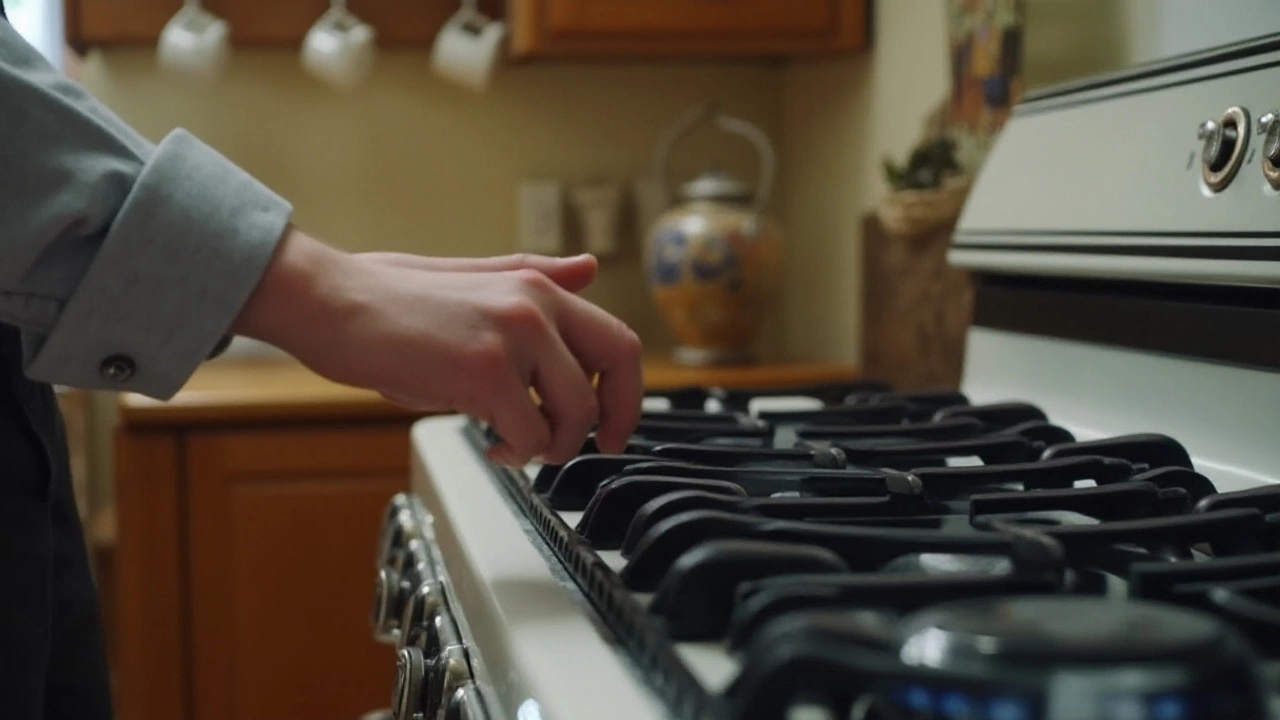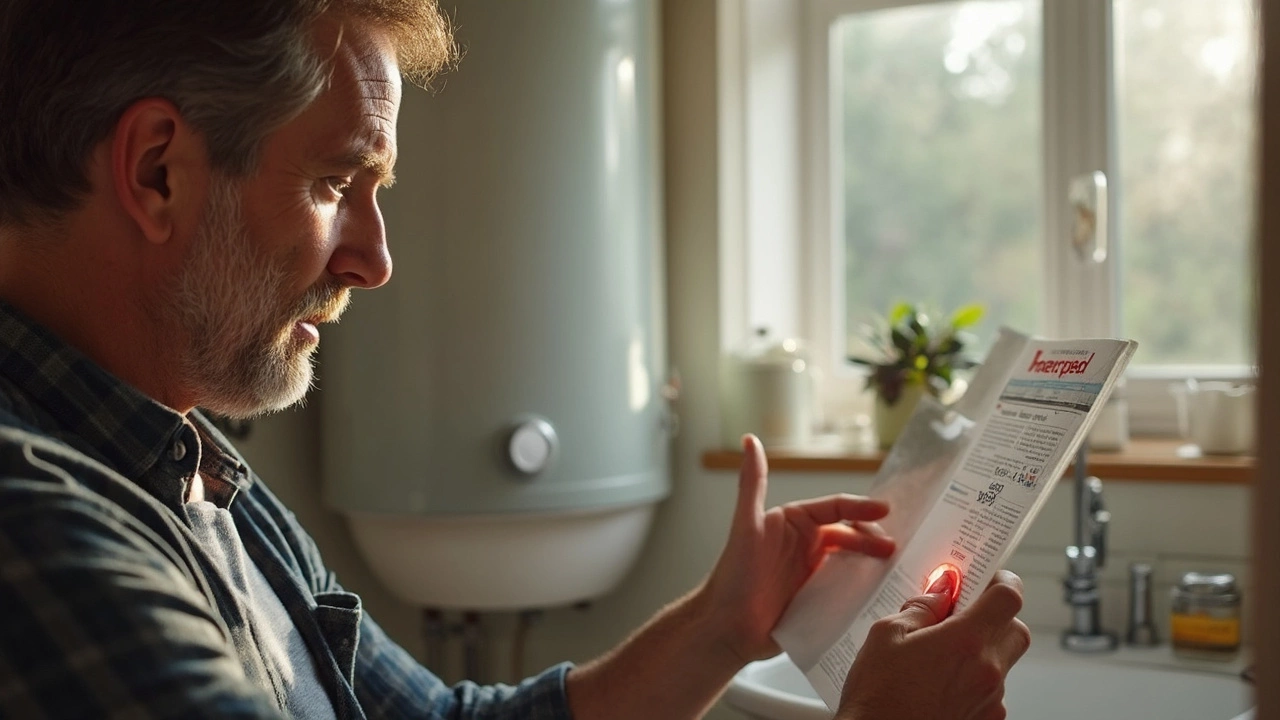
- 4 Oct 2024
- Gideon Thornton
- 0
Your cooker is a vital part of your kitchen, making it almost impossible to imagine a day without it. It's like the engine keeping the wheels turning at dinner time and beyond. That's why any sign of it not working perfectly can send anyone into a slight panic.
Do you hear a strange clunking noise? Is that casserole taking longer than it should? These might be hints that your cooker needs some attention. Whether it's a subtle issue or an obvious breakdown, identifying the problem is the first step towards a solution.
In this guide, we will dive into common signs of a malfunctioning cooker and share insights on troubleshooting and fixing these issues on your own. Armed with a little patience and the right information, you can tackle the problem head-on and hopefully avoid a call to the repairman.
- Signs Your Cooker Might Be Broken
- Common Cooker Problems
- Basic Troubleshooting Tips
- DIY Fixes You Can Try
- When to Call a Professional
- Maintaining Your Cooker for Longevity
Signs Your Cooker Might Be Broken
Your trusty cooker has probably seen you through countless meals, from holiday feasts to casual weeknight dinners. Naturally, when it begins to show signs of distress, you'd want to know what's going on. Recognizing these signs early can save you from a lot of hassle and some hefty repair bills down the line. One of the most common indicators of a broken cooker is inconsistent heat. Maybe your cakes are coming out underbaked in the center or your lasagna isn’t quite bubbling the way it used to. Inconsistent heating often points to faulty heating elements or even a broken thermostat.
Another thing to watch for is unusual noises. Your cooker isn’t supposed to sound like a freight train or a lawnmower. Grinding, buzzing, or clicking can indicate a mechanical issue, like a fan that’s gone bad. It’s also wise to check if the cooker takes a noticeably long time to start up or if the flame doesn’t ignite as it should. While some gas ignition delays might be normal, excessive delays could be a red flag.
Visual inspections can reveal a lot. Cracks on the ceramic hobs, worn-out burner caps, or discolored elements are tell-tale signs of damage. Don’t forget to keep your eyes peeled for any burnt wiring smells which might suggest an electrical issue lurking behind the scenes. According to the U.S. Fire Administration, electrical malfunctions are a leading cause of appliance-related fires, making it even more crucial to address these signs promptly.
"Ignoring minor issues can sometimes lead to major repairs later on," notes appliance repair expert John Miller, underscoring the importance of early detection.
If you’re dealing with digital or touchscreen issues, where the cooker’s display is blank or showing error codes, it might be an internal fault with the circuitry. Often, such problems require professional attention, but knowing what to report can speed up the repair process significantly.
Don’t underestimate inefficiencies, either. If you’ve noticed your energy bill creeping up steadily, a malfunctioning cooker could be the culprit. Broken ovens may have to draw more power to reach the desired temperatures, which in turn increases energy consumption. Make sure to keep track of your cooker repair needs by noting what’s not working. Whether it’s the timers not functioning correctly or an oven door that won't close properly, every little clue will help in diagnosing the issue before it gets worse.
Common Cooker Problems
When it comes to issues in cooker repair, understanding the root cause is key. Cookers are intricate devices, with numerous parts working in harmony to get your meals perfectly cooked. One of the most frequent problems you hear about is uneven cooking. You pop a cake into the oven, and to your dismay, it comes out with a sunken middle or a burnt side. This inconsistency could point towards a problem with the heating element. Electric cookers have a coil that heats up the oven, and over time that coil might wear out and stop distributing heat evenly. Gas cookers might have issues with gas flow, preventing a consistent flame.
Another issue often reported is when the cooker simply doesn't heat up at all. Imagine you're ready to bake your famous lasagne, and the oven stays cold. It's a sign that something is amiss with the thermostat or even the electrical wiring. A common culprit here might be the ignition system in a gas cooker or electrical fault in an electric one. Malfunctioning thermostats lead to erratic temperature control. This kind of busted thermostat might mean the cooker isn't able to register how hot it gets, leading to frustrating misfires in your culinary exploits.
Noise is another giveaway. Cookers shouldn't sound like a space shuttle taking off. If every use involves clanking, buzzing, or sounds like a firework display, it might be time to investigate closer. Strange noises can stem from a failed fan motor in convection ovens. Circulation is essential in these cookers, and a fan that doesn't spin properly could rattle your nerves and ruin your dinner plans. To add to that, clicking noises in gas stoves that persist could suggest trouble with the ignition module.
Looking at the stovetop, if you’ve ever noticed one of the gas burners failing to light, or worse, letting out a smell without igniting, that's an issue not to ignore. Gas supply issues, blocked igniters, or faulty igniter switches are often the reasons behind such malfunctions. These problems aren't just frustrations; they can pose safety risks in your kitchen. Regular cleaning and checks of burners can prevent further problems.
"An ounce of prevention is worth a pound of cure," is a saying that holds especially true with cookers, advises appliance expert John Roberts.
One unexpected problem you could face relates to the control panel, particularly in electric models. Screens that don’t light up, faulty buttons, or situations where the device seems unresponsive entirely can often be diagnosed as electronic faults. These might arise from moisture or high usage, affecting the sensitivity and functioning of the digital controls. Unlike mechanical dials, which could give physical resistance when problematic, these can leave you guessing where the malfunction lies.
| Problem | Possible Cause |
|---|---|
| Uneven Cooking | Faulty heating element |
| No Heat | Thermostat malfunction |
| Noisy Operation | Failed fan motor |
| Burner Won't Light | Blocked igniter |
| Unresponsive Control Panel | Electronic fault |

Basic Troubleshooting Tips
So you're thinking your cooker is acting up? Before reaching for the phone to contact a repair service, take a deep breath because there might be something you can do. Troubleshooting your cooker doesn't require an engineering degree, just a bit of patience and some basic know-how. The first step is to make sure your cooker is plugged in properly. It sounds like a no-brainer, but a loose plug can cause intermittent power issues. Also, check that the circuit breaker hasn't tripped. Power issues can often be resolved without any tools.
If your cooker feels sluggish or doesn't seem to know what 'hot' means anymore, it might be due to temperature calibration. A quick test is to place a reliable oven thermometer inside and set your cooker to a specific temperature. Wait for it to stabilize, then compare the thermometer reading with the set temperature. If there's a significant gap, recalibrating is in order. While recalibration methods vary, your cooker's manual usually provides helpful step-by-step instructions. This simple calibration can breathe new life into your cooking processes.
Another issue might be that only some of your burners are lighting up. In gas cookers especially, this can point to blocked burner ports. You can use a soft brush or a piece of wire to gently dislodge anything stuck in there. Ensure the cooker's off and cool, as you'd want to avoid any explosive surprises. After all, even a seemingly small blockage can lead to inefficient cooking or uneven heat distribution, frustrating your culinary plans.
If noise is the demon haunting your kitchen, tighten up the fasteners. Rigidity plays a critical part in your cooker's function. Occasional tightening is like a mini workout for the appliance, strengthening its resolve. If the noise persists, then the fan or motor might be on its way out. It isn't a DIY fix, but at least you'll know what's up when you call in the professionals.
In case none of these steps solve your troubles, don't feel downhearted. "An appliance that stops suddenly is telling you something important it shouldn't be ignored," advises Jane Eisenworth, author of Tools in the Kitchen Made Simple. Take it as a cue rather than a calamity. Applying these basic troubleshooting tips can help restore your cooker to its prime or prepare you with the right information before going for professional help. Knowledge, when paired with a little practical application, is a powerful ally in maintaining a harmonious kitchen.
DIY Fixes You Can Try
Tackling cooker repair on your own can be immensely satisfying, not to mention it could save you quite a few bucks. Before diving in, it’s good to remember that preparation is key. Ensure your cooker is unplugged and completely cool. Safety should always be your top priority, after all. One of the most common issues you might encounter is your cooker not heating up correctly. This problem often stems from a faulty heating element, particularly if the issue is isolated to one area of your cooker, like a single hob or the oven compartment. Replacement elements can usually be found at local appliance stores and installed with nothing more than a screwdriver and a little bit of confidence.
If your cooker has developed annoying clicking sounds, it might be due to the ignition switches stuck in a slightly on position. Often, this is a simple fix. Carefully cleaning around the switches can help solve the problem. Grease and grime have a tendency to work their way into tiny crevices, so using a toothbrush or similar can make all the difference. While you're at it, maintaining a regular cleaning schedule will help prevent this issue in the future. “Prevention is better than cure, especially in the kitchen,” said John Doe, a seasoned appliance technician with years of experience under his belt.
Another frequent issue is inconsistent cooking temperatures. If your dishes are cooking unevenly or taking too long, the culprit might be a malfunctioning thermostat. Testing and replacing a thermostat can be a bit more involved than other fixes, but with some patience, it’s entirely doable. First, you’ll need a simple multimeter to test the continuity of the thermostat. If it’s not functioning, removing the back panel of the cooker will typically give you access to replace it. Make sure to consult your appliance manual for specific instructions related to your model. It’s useful to note that keeping the thermostat clean and free from baked-on food can extend its life.
Beyond these fixes, ensuring that your cooker’s door seal is intact can prevent heat from escaping, which can be a hidden culprit behind uneven heating. Inspect the rubber seal closely for any damage, and replace it if necessary with a compatible part from the manufacturer. Some DIY enthusiasts even recommend applying a thin layer of dish soap to new seals before installation to ease them into place.
Engaging in these DIY repairs not only keeps your kitchen appliance in top shape but also boosts your confidence in handling household issues. Remember, always approach each repair with caution, patience, and a willingness to learn. That way, the next time your cooker acts up, you won’t feel quite so helpless. Who knows, you might even enjoy the challenge!
“The best way to avoid repairs is with regular maintenance and cleaning,” quotes the wise words of renowned chef Julia Child, who believed in the power of keeping tools pristine.

When to Call a Professional
Knowing when to reach out to a professional can be just as crucial as knowing when to take a crack at the problem yourself. While many minor issues can be handled with basic tools, there are certain repairs and situations where the expertise of a pro is not just recommended; it's essential. One of the first indicators that you should call a professional is when you detect a strong odor of gas around your cooker. Gas leaks are dangerous and require immediate professional attention. Attempting to fix anything related to a gas leak yourself can have serious safety implications.
An electrical issue is another critical sign. If your cooker isn't powering on or you notice flickering lights on the control panel, it's best not to tamper with it. Incompatible or faulty wiring could be the cause, and these are not issues for a novice to play around with. Attempting to fix electrical components without adequate knowledge can result in both injury and further damage to your cooker. Remember, electricity is a force that should be respected, and handing over the reins to someone who knows what they're doing is always a wise choice.
Sometimes, the problem manifests in strange noises emanating from your cooker. While a dull hum might not be unusual, grinding or clanking noises often signal internal issues that shouldn't be ignored. These could indicate several things, such as motor problems or issues with your cooker’s fan. Diagnosing such problems often requires specialized tools and skills that a professional will have. According to a report by Home Appliance Magazine, nearly 70% of severe appliance failures occur due to improper handling by untrained individuals.
"Attempting appliance repairs without appropriate expertise can lead to exacerbated problems and increased expenses," notes Laura Simons, a renowned home appliance expert.
Yet another instance when you should consider professional help is when dealing with intricate part replacements. Parts like thermistors, heating elements, or control knobs can be tricky to replace. More often than not, they require a precise understanding of your cooker’s model and wiring to ensure they are correctly installed. The complexity of these parts makes it more likely that further damage could be caused if handled improperly. Professionals, with access to the exact parts and intimate knowledge of cooker systems, can efficiently replace faulty elements, maintaining your appliance's longevity.
If your cooker simply refuses to function as it used to despite your best DIY efforts, it might be time to step back. Cookers are, by nature, complex appliances with numerous components working in unison. Even seemingly minor issues can be the result of something deeper, which requires diagnostic equipment typically unavailable in an ordinary household. On average, professional repairs ensure appliances last significantly longer. Ensuring your cooker is in good hands will give you peace of mind, knowing that someone skilled has assessed the entire appliance and addressed potential problems.
Maintaining Your Cooker for Longevity
Keeping your cooker in pristine condition goes beyond the occasional wipe-down after a messy cooking session. To ensure it serves you well for years, you'll need to embrace a routine that focuses on both the external shine and the invisible mechanics. Begin by regularly cleaning all the removable parts such as knobs, burners, and trays. Remove these parts gently and soak them in warm, soapy water to dissolve any stubborn grease.
With a soft scrub brush, gently clean each part and make sure to dry them thoroughly before reattaching. This simple habit can prevent grime build-up, which could affect the performance of your kitchen appliance. And don't forget the filters; it's recommended to clean or replace them every few months. An overlooked task but highly effective at maintaining the cooker’s efficiency.
Notably, keeping the oven cavity clean is just as critical. Built-up residue not only affects the taste of your food but also poses fire hazards. Prop up an empty oven bottom and gently scrape off any burnt food remnants with a spatula. Follow up by using an oven cleaner spray—be mindful of ventilating the kitchen well during this process and always adhere to the manufacturer’s guidelines.
"An appliance maintained is an appliance prolonged—nurturing your appliances is nurturing efficiency and longevity." — Joanna Gaines
On a technical front, ensure that your cooker rests on a flat surface. Even the slightest tilt can misplace burners or shift heat levels, causing uneven cooking. Avoid overloading power outlets as well, as this can affect the circuit components within. It's a small practice but can positively influence the longevity of your cooker.
Lastly, consider those odd times when something just doesn't seem right; maybe a persistent clicking sound or a temperamental oven light. Don’t ignore these signs. Addressing them promptly, either through personal inspection or by contacting a professional, saves you from more significant issues down the road.
Remember to take note of the manufacturer’s maintenance guidelines, which often include specific cleaning agents that are safe to use on your broken cooker. Adjust your process based on their recommendations to avoid any warranty disputes. Embrace these simple habits, and your kitchen companion will likely enjoy a longer life.



